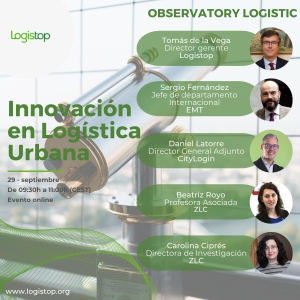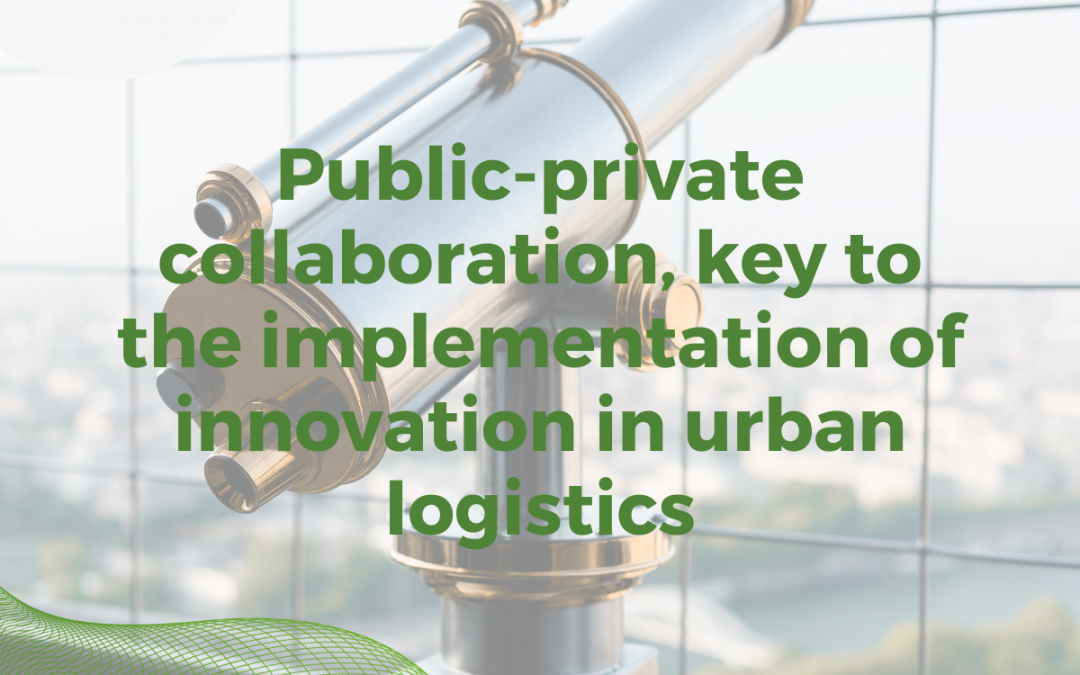-
Data sharing is another key element.
-
Standardisation becomes necessary in the quest for efficiency and sustainability in urban logistics.
-
By 2030, urban last mile deliveries are expected to grow by 78%.
At the Observatory Logistic Urban Logistics Innovation event, experts from the sector presented some projects and success stories that are enabling significant advances to be made in urban logistics and innovation in this field. On this occasion, we had the introduction and moderation of Tomás de la Vega, Managing Director, Logistop, and the participation of Sergio Fernández, Head of International Department, EMT, Daniel Latorre, Deputy General Manager, and Alfonso Molina, Project Manager, CITYlogin, and Beatriz Royo, Associate Professor, and Carolina Ciprés, Director of Research, ZLC – Zaragoza Logistics Center.

Urban freight transport has increased in recent years due to, among others, higher demand in e-commerce. Decarbonising urban freight transport is a challenge for many cities, while companies and logistics operators also face challenges to increase efficiency and meet customer demand. Innovation plays an important role in decarbonising urban freight transport and enabling sustainable urban logistics.
In search of a culture of public-private collaboration
Sergio Fernández indicated that, since 2013, EMT has been taking on another series of mobility services in the city, including rotation car parks or mixed car parks, underground car parks, etc., which can play an important role in the entire logistics chain. And, in this sense, they have been an active part of LEAD, a project that responds to an adapted last-mile and low-emission logistics in support of the on-demand economy through digital twins.
“The objective is to rationalise urban logistics and make it essentially zero-emission in major urban centres by 2030, in line with European targets”
Sergio Fernández, Head of International Department, EMT
Both Daniel Latorre and Alfonso Molina highlighted the key role of data sharing, a factor that has made it possible to create models as close as possible to reality and, therefore, to make better decisions based on these data.
“It has been very important to demonstrate efficiencies in terms of public-private collaboration in order to develop this new typology of more efficient and beneficial business models”
Alfonso Molina, Project Manager, CITYlogin
Latorre also emphasised the need to standardise codes in the industry to optimise data management and promote logistical efficiency.
Beatriz Royo explored the concept of “Digital Twins” and their capacity to absorb information in real time in the framework of the LEAD project. She analysed the economic, social and environmental impacts of the logistics innovations made in the framework of the LEAD project and how these results can improve both sustainability and profitability. Royo also stressed the need for a culture of public-private collaboration to drive innovation in this evolving field.
“The Digital Twins are a very powerful tool for improving decision-making, but there is still a long way to go to be able to collect all the information and obtain the potential value they are supposed to have”
Beatriz Royo, Associate Professor, ZLC
To conclude the day, Carolina Ciprés analysed the roadmaps that are emerging in the field of urban logistics, both at European and global level, which will allow us to continue to grow in this area in a sustainable manner and highlighting the importance of data sharing.
Ciprés also highlighted the important role that must be played with regard to consumer engagement, which is key to making a difference, as well as the change in the model of delivery points, among some of the challenges and changes that urban logistics must face in the coming years.
“When we talk about consumer engagement, the consumer in the way he or she buys online, for example, can change urban logistics, but he or she should have the information. We should inform them if their decision is more or less sustainable”
Carolina Ciprés, Research Director, ZLC
About Logistop
At Logistop we transform the supply chain through innovation, helping industry and companies to become more efficient and sustainable.
We are a multidisciplinary and inter-territorial working space in the logistics innovation arena formed by all the actors involved in the supply chain, as well as universities, technology centres, associations and specialised consultancy firms.
One of Logistop’s main objectives is:
- To promote the need for innovation among companies involved in the logistics sector;
- To promote innovation projects;
- To communicate the real needs of the sector at an institutional level.

